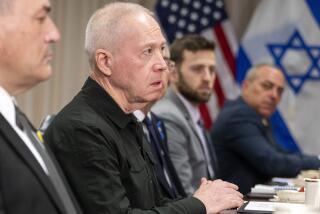U.S., Britain say no early exit from Afghanistan
- Share via
Reporting from Kabul, Afghanistan, and Washington — President Obama and British Prime Minister David Cameron tried to project a clear and steady commitment to their strategy for the war in Afghanistan even as a possible attack at a U.S. base there during a visit by the secretary of Defense highlighted the country’s tenuous hold on security.
Appearing together in the Rose Garden during Cameron’s first official visit to the White House, the leaders rejected calls to speed up the withdrawal from Afghanistan and sought to build support for the war effort.
“We will not give up on this mission,” Cameron told reporters at a joint news conference after he and Obama met.
“No one wants war,” Obama said, but he added that he remained committed to what he called a “steady, responsible transition process.”
Both took pains to remind their electorates of the rationale for having troops in Afghanistan.
“You have to go back and remember that the vast majority of terrorist plots that were affecting people in the U.K., people in the U.S., came out of that country and that region,” Cameron said. “We want Afghanistan to be able to look after its own security with its own security forces so we are safe at home.”
But as they spoke, news of another violent incident drew attention to how unsafe the country remains, even in some of its most guarded places. At Camp Bastion, a British air base in southern Afghanistan, an Afghan man drove a stolen pickup truck onto a ramp near the runway, emerging from the vehicle in flames about the same time that Defense Secretary Leon E. Panetta was landing, officials said.
No explosives were found in the truck, which ended up in a ditch, or on the man, whose body was badly burned, Pentagon spokesman George Little said.
The man, a civilian who worked on the base, was taken into custody and Panetta was never in danger, officials said. The incident was under investigation, including the possibility that it was an attempted attack aimed at the Defense secretary, officials said.
Afterward, Panetta went ahead with remarks to hundreds of Marines and several dozen Afghan soldiers in a large tent at an adjacent U.S. base, Camp Leatherneck. Even there, there were indications that officials were on edge.
In a departure from normal procedure, the Marines and Afghans were ordered not to have their weapons inside the tent. The extra security was announced abruptly as the crowd awaited Panetta’s speech. Marine Sgt. Maj. Brandon Hall said Marines should exit the tent and leave their rifles and pistols outside because “something has come to light.”
Hall said he didn’t know why the unusual order was given. “Somebody got itchy,” he said.
Maj. Gen. Mark Gurganus, the Marine commander in Helmand province, said later that he ordered the Americans to leave their weapons outside because Afghan soldiers in attendance were not allowed to be armed.
The question of U.S. and British troops’ safety — and how seriously they are threatened by their Afghan comrades — has been a persistent one in the wake of attacks by Afghan soldiers and civilian personnel, sometimes against the NATO troops charged with training them. The tension and violence have escalated, fueled by the recent burning of Korans at a U.S. base and reprisals that killed U.S. troops, as well as a shooting rampage by a U.S. soldier Sunday that left 16 civilians dead.
The soldier accused in the rampage has been flown out of Afghanistan to Kuwait, a senior Defense official said, which means he will almost certainly not stand trial in Afghanistan, as some Afghan officials and clerics have demanded.
Panetta’s unannounced trip to Afghanistan was another attempt to try to ease the strain on relations.
U.S. officials appeared worried that disclosure of the carjacking at the base would overshadow the purpose of the trip. They did not immediately disclose the incident, briefing reporters traveling with Panetta only after news leaked out in the British media.
Panetta did not refer to the incident in his remarks to the troops.
“We will not allow individual incidents to undermine our resolve,” he said, referring to the shooting rampage and the Koran burning. “As tragic as those events of violence have been, they do not define the relationship between coalition forces and Afghan forces.”
In Washington, leaders also sought to project their commitment to a strategy that calls for complete withdrawal of combat troops by the end of 2014.
“I don’t anticipate at this stage that we’re going to be making any sudden additional changes to the plan that we currently have,” Obama told reporters.
Still, the tentative language hinted at the internal debate about the precise pace the drawdown of combat troops will take next year.
Obama affirmed his commitment to a “robust” force through the end of the year, but repeated that force levels beyond that would be up for discussion at a NATO meeting in May.
kathleen.hennessey@latimes.com
Cloud reported from Kabul and Hennessey from Washington.
More to Read
Sign up for Essential California
The most important California stories and recommendations in your inbox every morning.
You may occasionally receive promotional content from the Los Angeles Times.












